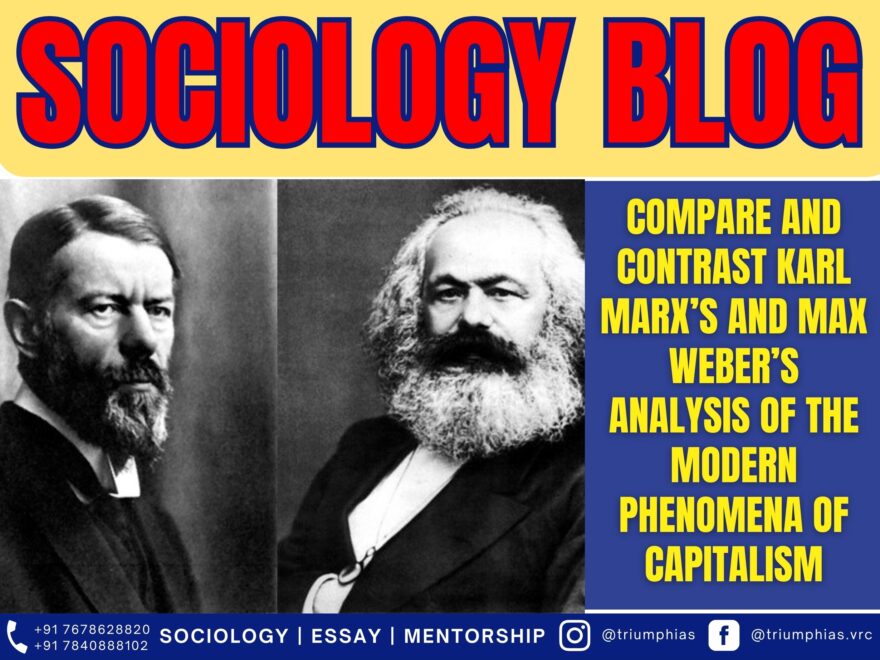Compare and contrast Karl Marxs and Max webers analysis of the modern phenomena of capitalism
Relevance: Sociology: Paper I: Sociological Thinkers
LEARN THIS ARTICLE THROUGH THESE VIDEOS EASILY
Approach:
- Define the concept of capitalism with reference to Marx and Weber
- Bring out the comparative analysis with respect to the emergence, consequence of capitalism
- Overall analysis
- Conclusion
Marx describes capitalism as “one of the historical stages through which the society passes”. Whereas, Weber, attempts an interpretative understanding of social phenomena. Hence he understands capitalism in terms of the “psychological motivations of individuals, by interpreting their world view and the meanings they attach to their activities”.
- Marx sees the emergence of capitalism in terms of a shift in mode of production. According to him, the economy of the material world is the infrastructure or base, which moulds the other sub-systems like culture, religion, polity and the like. So a change in the system is seen primarily as a change in economic system. The emergence of capitalism is thus explained in terms of a changed mode of production which results from the contradictions within the earlier historical stage, in this case, feudalism.
- Whereas, Weber’s analysis is much more complex. He does not ignore economic factors in the emergence of rational capitalism. But to him, the problems of meanings, motivations and world view individuals are important. World-view, values, beliefs, sentiments helps to guide action, including economic action. So, in order to understand why and how rational capitalism emerged, Weber thinks it’s important to understand the value system that makes it possible. His book The Protestant Ethic and the Spirit of Capitalism reflects this outlook.
While Marx put economy before religion, Weber put religion before economy. This is a rather simplistic way of seeing their work. It is more appropriate to say that Weber’s analysis complements that of Marx by introducing new dimensions and new angles with which to view as complex a phenomenon as capitalism.
- Karl Marx views capitalism as a symbol of exploitation, dehumanization and alienation of the working class. It is a system based on inequality and will ultimately break down. This break down will be brought about by its own inner contradictions. The proletariat will bring about a revolution and thus a new stage of human history, namely communism will be born.
- For Weber too, rational Capitalism is basically alternative for human society. Rational capitalism and the rational bureaucratic stage go hand in hand. Human life gets routinised, human beings experience disenchantment of the world. But Weber is pessimistic about the future. Unlike Marx, he does not think revolution or collapse of the system very likely.
- This is because rationality, the basic idea, which supports capitalism, is very necessary for all human activity in the modern world. The progress of science and technology and the human quest to gain control over nature and the world are processes that cannot be reversed. Hence revolutions and rebellions cannot fundamentally change the direction in which society is moving.
While Marx emphasizes the irrationality and contradictions in capitalism, which will, according to him, lead to change. Weber speaks of its rationality. It is this very rationality however, which imprisons human beings in its iron cage.
On the basis of comparative analysis of Marx’s and Weber’s perspective on capitalism we conclude following points:
- Both Marx and Weber were intrigued by the changes in society at the same time of industrialization. While Marx was seeking a revolution Weber was content to explore the reasons why capitalism had developed.
- Both saw society moving in a direction that was unsuitable for the people, but while Weber saw no way out Marx was sure that things would have to change.
- The problem of capitalism was the principal theme of both Marx and Weber. But the two theorists approached the topic from different angles, guided by distinctive overarching questions about modern capitalist society.
- Marx’s central concern was the discovery of the economic laws that explained how capitalism worked and how it would, eventually, break down as its excesses created the conditions for revolutionary change. Weber, however, was primarily interested in how capitalism came to be and why it developed in Western Europe rather than some other civilization. They had disparate views of history and of economics; Marx and Weber developed very different answers when addressing similar questions.
- Both the thinkers have discussed about the rise of capitalism, Karl Marx shaped his view through his historical materialism while Max Weber focused on the forces which shape the history. A fundamental premise of Marx is that economic or material factors determine the course and outcome of history (historical materialism or economic determinism).
- Weber viewed economics as one among many important factors which contributed to the evolution of human society. He laid considerable emphasis on the importance of charismatic leadership and new ideas as determinants of historical change. He saw the rise of capitalism as the psychological product of a particular set of beliefs which he labeled the protestant ethic.
Modern Times is a visualization of Marx’s theories about the proletariat and the bourgeoisie. The proletariat does the majority of the work while the owners of the capital reap all the benefits. Marx puts it best when he says, “Not only are they the slaves of the bourgeois class, and of the bourgeois State; they are daily and hourly enslaved by the machine, by the over looker, and, above all, by the individual bourgeois manufacturer himself”. To Marx, the boss is the ultimate slave driver; working little and caring even less about the people who make him a profit.
If Weber were to see Modern Times and discuss the portrayal of the boss with Marx they would find that they have a serious conflict of ideas. While Marx sees the boss as lazy and tyrannical Weber sees an entirely different picture. Weber saw the rise of capitalism as the result of what he called, “The Protestant Work Ethic”.
The Protestant belief in worldly asceticism, or the denial of pleasure, led to reinvestment of capital. As capitalism rose and the economy began to change people were continuously reinvesting the money they earned. The people were working hard and instead of taking their salary and spending it right away it was put away. This continuous work ethic was a result of the belief that while our fate is predestined God wants us to labor, and because we do not know our fate we must work hard and hope to gain entrance into heaven.
- Marx’s capitalist boss is lazy and demanding, but on the basis of the protestant work ethic this is not true of Weber’s boss. For Marx the problem with possession was that it distributed wealth unevenly. Weber reports that the only problem with possession as far as the Protestants were concerned was the temptation to be lazy.
Although, Marx and Weber consider capitalism using different approaches. Both thinkers point out that capitalism has negative consequences for human society. However, their vision of the future is very different. Marx preaches revolution and change but Weber has no such hopes. To Marx capitalism is rooted in irrationality but for Weber it is a reflection of rationality.

To master these intricacies and fare well in the Sociology Optional Syllabus, aspiring sociologists might benefit from guidance by the Best Sociology Optional Teacher and participation in the Best Sociology Optional Coaching. These avenues provide comprehensive assistance, ensuring a solid understanding of sociology’s diverse methodologies and techniques.
META TAGS:
Marxs and Max Weber, capitalism, emergence of capitalism, consequences of capitalism, exploitation, Protestant work ethic, rationality, revolution, economic determinism, psychological motivations, social phenomena, industrialization, bourgeoisie, proletariat, historical materialism, charismatic leadership, economic factors.
Why Vikash Ranjan’s Classes for Sociology?
Proper guidance and assistance are required to learn the skill of interlinking current happenings with the conventional topics. VIKASH RANJAN SIR at TRIUMPH IAS guides students according to the Recent Trends of UPSC, making him the Best Sociology Teacher for Sociology Optional UPSC.
At Triumph IAS, the Best Sociology Optional Coaching platform, we not only provide the best study material and applied classes for Sociology for IAS but also conduct regular assignments and class tests to assess candidates’ writing skills and understanding of the subject.
Choose The Best Sociology Optional Teacher for IAS Preparation?
At the beginning of the journey for Civil Services Examination preparation, many students face a pivotal decision – selecting their optional subject. Questions such as “which optional subject is the best?” and “which optional subject is the most scoring?” frequently come to mind. Choosing the right optional subject, like choosing the best sociology optional teacher, is a subjective yet vital step that requires a thoughtful decision based on facts. A misstep in this crucial decision can indeed prove disastrous.
Ever since the exam pattern was revamped in 2013, the UPSC has eliminated the need for a second optional subject. Now, candidates have to choose only one optional subject for the UPSC Mains, which has two papers of 250 marks each. One of the compelling choices for many has been the sociology optional. However, it’s strongly advised to decide on your optional subject for mains well ahead of time to get sufficient time to complete the syllabus. After all, most students score similarly in General Studies Papers; it’s the score in the optional subject & essay that contributes significantly to the final selection.
“A sound strategy does not rely solely on the popular
Opinion of toppers or famous YouTubers cum teachers.”
It requires understanding one’s ability, interest, and the relevance of the subject, not just for the exam but also for life in general. Hence, when selecting the best sociology teacher, one must consider the usefulness of sociology optional coaching in General Studies, Essay, and Personality Test.
The choice of the optional subject should be based on objective criteria, such as the nature, scope, and size of the syllabus, uniformity and stability in the question pattern, relevance of the syllabic content in daily life in society, and the availability of study material and guidance. For example, choosing the best sociology optional coaching can ensure access to top-quality study materials and experienced teachers. Always remember, the approach of the UPSC optional subject differs from your academic studies of subjects. Therefore, before settling for sociology optional, you need to analyze the syllabus, previous years’ pattern, subject requirements (be it ideal, visionary, numerical, conceptual theoretical), and your comfort level with the subject.
This decision marks a critical point in your UPSC – CSE journey, potentially determining your success in a career in IAS/Civil Services. Therefore, it’s crucial to choose wisely, whether it’s the optional subject or the best sociology optional teacher. Always base your decision on accurate facts, and never let your emotional biases guide your choices. After all, the search for the best sociology optional coaching is about finding the perfect fit for your unique academic needs and aspirations.
Follow us :
🔎 https://www.instagram.com/triumphias
🔎https://www.youtube.com/c/TriumphIAS
🔎https://t.me/VikashRanjanSociology
Find More Blogs
| Compare and contrast Karl Marx’s and Max weber’s | Karl Marx- Historical Materialism |
| Position of Women In the Modern Indian Society | Sociology: Social system and pattern variables |
WATCH OTHER VIDEOS




771 comments